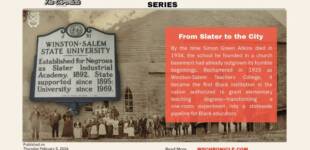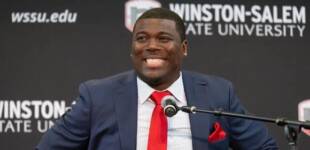Professor trains coaches to tackle sexually offensive talk
Imagine what would happen if a high school teacher encouraged students to perform well by alluding to sexual violence or derided a student’s efforts in the classroom by using slang for a woman’s body part. Few, if any, school systems would tolerate such abusive language in the classroom.
Donna Duffy, a UNCG faculty member, argues the same standards should apply to coaches interacting with their players. She has created a one-hour workshop, “Coaching Coaches: An Educational Workshop to Reduce and Prevent Sexually Violent Language in Coaching,” that encourages high school coaches and athletic directors to use language that is corrective and constructive when teaching and motivating their athletes, rather than language that is derogatory, sexually violent or blatant name calling.
The use of rough language – such as encouraging players to “rape” their opponents – desensitizes people from the real trauma of sexual violence, Duffy said.
Language is learned. Language sets the tone. Language creates the culture. It allows people to communicate in groups effectively. No athletic director would ever argue with reducing the amount of sexually violent language in the school day.
“High school sports are an interscholastic event, an extension of the school day,” Duffy added. “The same behavioral expectations in terms of appropriate communication should be expected during the high school sporting hours. If a teacher addressed a student by calling him or her anatomical slang for not turning in their math homework or for failing a test, it is likely that the teacher would be suspended or fired. But for some reason, we don’t extend this expectation to the sporting environment — and that is a problem.”
Duffy is an assistant professor of kinesiology in the UNCG School of Health and Human Sciences and the director of the Program for the Advancement of Girls and Women in Sport and Physical Activity. Her research centers around sexual violence in athletics. Outside the classroom, you can often find her on the sidelines in and around Greensboro coaching women’s field hockey. She says she knows and hears the content of coaches’ language firsthand.
“Being a coach as long as I’ve been a coach and growing up in a coaching family, I’m very aware of how people communicate,” Duffy said. “If we have coaches – and equate them as teachers – using this kind of language and it normalizes it, there is a big issue.”
Program evaluations indicate the training is getting results. Over 80 percent of coaches report the workshop will help them do their jobs differently and better, more than 70 percent said they’d be able to recognize sexually violent language that’s not so aggressive or overt, and more than half of participants said they’d know what to do to stop the use of violent language.
The “Coaching Coaches” workshop, which has been in use for two years, was funded by a grant from the Winston-Salem-based Z. Smith Reynolds Foundation and created in partnership with the N.C. High School Athletic Association and the N.C. Coalition Against Sexual Assault. So far, about 150 coaches and 30 athletic directors from across North Carolina have attended the training. The workshop’s information has also been presented at numerous regional and national conferences. An online version of the workshop is currently in development and is expected to be available in early fall.









